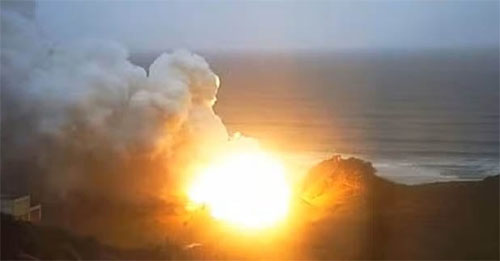News Flash
News Flash

TOKYO, Nov 26, 2024 (AFP) - A huge fire erupted Tuesday at a Japanese rocket testing station, sending flames and smoke soaring into the sky, in the latest mishap for the country's ambitious space programme.
There were no reports of injuries in the incident, in a remote area of Kagoshima in southern Japan, where a solid-fuel Epsilon S rocket was being tested.
Footage on national broadcaster NHK showed towering balls of fire and white fumes rising from the Tanegashima Space Center.
Journalists stationed around 900 metres (yards) away reported a large explosion shortly after the combustion test began at 8:30 am (2330 GMT Monday).
On Tuesday evening, hours after the accident, the Japan Aerospace Exploration Agency (JAXA) said "the cause was still unknown".
It will take the agency "at least a few months" to identify the cause, make adjustments and, if necessary, conduct another combustion test, JAXA project manager Takayuki Imoto told a briefing.
The agency told AFP earlier that there was "an abnormality" during Tuesday's test.
The incident could severely complicate the agency's plan to launch the Epsilon S -- the successor to the Epsilon -- by March, with the Asahi Shimbun daily describing the target as "hopeless".
The latest setback will have a "significant" impact on the timeline of JAXA's space mission, Imoto said.
In July 2023, one engine of an Epsilon S exploded during a test around 50 seconds after ignition.
In that incident, a piece of metal from the ignition melted and damaged the thermal insulator covering the engine, allowing fuel to catch fire, Kyodo News reported.
- String of setbacks -
Since that misstep last year, "we have done everything we can to identify what went wrong... we regret this happened again, and feel sorry we failed to live up to everyone's expectations," Imoto said.
It was one in a string of setbacks for Japan's space programme, including launch attempts for its next-generation H3 launch system.
JAXA managed a successful blast-off in February this year for the H3, which has been mooted as a rival to SpaceX's Falcon 9.
But that followed a failed attempt in February 2023 when the ignition process failed. The following month a destruct command was issued shortly after blast-off.
"Including the Epsilon S, the development of flagship rockets is extremely important for the independence of Japan's space development programme," top government spokesman Yoshimasa Hayashi told reporters at a regular briefing on Tuesday.
In January, Japan successfully landed an unmanned probe on the Moon -- albeit at a crooked angle -- making it just the fifth country to achieve a soft landing on the lunar surface.
But in March a rocket made by a private Japanese company exploded seconds after launch.
Tokyo-based Space One's 18-metre (60-foot) Kairos rocket blasted off in the coastal Wakayama region of western Japan, carrying a small government test satellite.
Around five seconds later, the solid-fuel rocket erupted in fire, sending white smoke billowing around the remote mountainous area as orange flames raged on the ground, live footage showed.
Burning debris fell onto the surrounding slopes as sprinklers began spraying water, in dramatic scenes watched by hundreds of spectators gathered at public viewing areas including a nearby waterfront.
Space One said at the time that it had taken the decision to "abort the flight" and details were being investigated.